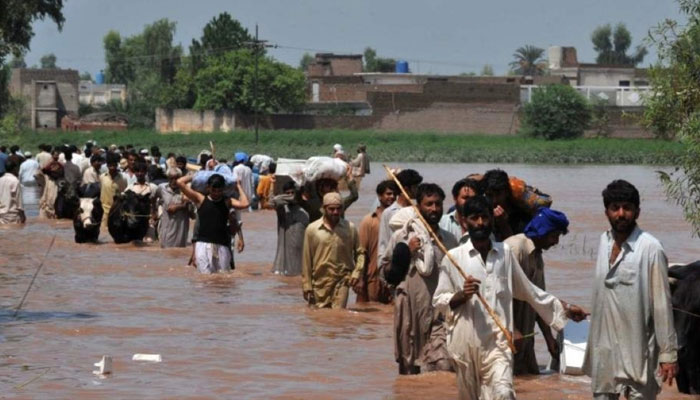Community empowerment with disaster resilience skills stressed
Islamabad: Pakistan, recognised as one of the world’s most disaster-prone nations, grapples with a host of climate-induced challenges, including recurring floods, droughts, and other extreme weather events. The increasing frequency and severity of natural disasters, exemplified by the catastrophic floods of 2022, have placed vulnerable communities at significant risk, jeopardising their lives, livelihoods, and access to essential resources and services, says a press release.
In response to these challenges, Islamic Relief, in partnership with the National Disaster Risk Management Fund (NDRMF), recently organised an event titled ‘RAPID: The Resilient Reflections.’ This initiative stems from the Resilient and Adaptive Population in Disaster (RAPID) project, which was launched with financial support from the Asian Development Bank to tackle the pressing climate challenges faced by districts in Balochistan and Khyber Pakhtunkhwa.
These projects have played a crucial role in safeguarding communities from flash floods, preserving water tables, preventing land degradation, and mitigating the effects of seismic activities. Romina Khurshid Alam and Senator Sherry Rehman attended as the chief guests at the event. Other notable attendees included Asif Sherazi, Country Director of Islamic Relief Pakistan; Bilal Anwar, CEO of NDRMF; Mohamed Yahya, UN Resident & Humanitarian Coordinator for Pakistan; Nathan A. Rive, Climate Change Specialist at the Asian Development Bank; Dr. Aneel Salman, OGDCL-IPRI Chair in Economic Security at the Islamabad Policy Research Institute; Kiran Afzal, Senior Private Sector Development Specialist at the World Bank Group; Muhammad Sohail, National Programme Coordinator at UNDP Pakistan; and Shabel Firuz, Head of Region Asia at Islamic Relief Worldwide.
Khurshid Alam stressed the importance of strong adaptation plans, noting the significant losses associated with disasters, including economic impacts and the mental trauma of losing homes and loved ones. “We must address these man-made disasters not just for ourselves but for all of us,” she concluded, advocating for proactive measures rather than waiting for every COP to address these urgent issues.
Chief guest, Senator Sherry Rehman, Chairperson of the Senate Standing Committee on Climate Change graced the event with her presence. She talked about the severe stresses faced by large populations due to resource scarcity.
In his opening remarks, Asif Sherazi, Country Director of Islamic Relief Pakistan, warmly welcomed the guests and stressed the urgent need for collective action on climate change, particularly noting its disproportionate impact on Pakistan.
-
 Will Smith, Jada Pinkett's Marriage Crumbling Under Harassment Lawsuit: Deets
Will Smith, Jada Pinkett's Marriage Crumbling Under Harassment Lawsuit: Deets -
 'Fake' Sexual Assault Report Lands Kentucky Teen In Court
'Fake' Sexual Assault Report Lands Kentucky Teen In Court -
 'Vikings' Star Shares James Van Der Beek's Birthday Video After His Death
'Vikings' Star Shares James Van Der Beek's Birthday Video After His Death -
 Jennifer Aniston Receives Public Love Note From Jim Curtis On 57th Birthday
Jennifer Aniston Receives Public Love Note From Jim Curtis On 57th Birthday -
 Microsoft AI Chief Says AI Will Replace Most White-collar Jobs Within 18 Months
Microsoft AI Chief Says AI Will Replace Most White-collar Jobs Within 18 Months -
 Late Virginia Giuffre’s Brother Reacts To King Charles’ Promise Against Andrew Mountbatten-Windsor
Late Virginia Giuffre’s Brother Reacts To King Charles’ Promise Against Andrew Mountbatten-Windsor -
 Ex-Arsenal Footballer Thomas Partey Charged With Additional Rape Counts
Ex-Arsenal Footballer Thomas Partey Charged With Additional Rape Counts -
 AI Regulation Battle Heats Up: Anthropic Pledges $20m To Rival OpenAI
AI Regulation Battle Heats Up: Anthropic Pledges $20m To Rival OpenAI -
 Queen Camilla Makes Poignant Visit To Police Stations To Inspect Work
Queen Camilla Makes Poignant Visit To Police Stations To Inspect Work -
 Chloe Kim Set For Historic Halfpipe Gold Showdown At Milano Cortina
Chloe Kim Set For Historic Halfpipe Gold Showdown At Milano Cortina -
 Brooklyn Beckham Gives Cold Response To Cruz's Olive Branch Amid Feud
Brooklyn Beckham Gives Cold Response To Cruz's Olive Branch Amid Feud -
 Woman Arrested Months After Allegedly Staging Husband’s Murder As Suicide
Woman Arrested Months After Allegedly Staging Husband’s Murder As Suicide -
 Senior US Politician Makes Formal Accusation Against Andrew As Woman Under Him Is Sex Trafficked
Senior US Politician Makes Formal Accusation Against Andrew As Woman Under Him Is Sex Trafficked -
 X Product Head Warns AI Spam Can Make IMessage And Gmail Unusable
X Product Head Warns AI Spam Can Make IMessage And Gmail Unusable -
 Tyler Childers, Wife Senora May Expecting Second Baby
Tyler Childers, Wife Senora May Expecting Second Baby -
 ‘Smiling Electrons’ Discovered In Earth’s Magnetosphere In Rare Space Breakthrough
‘Smiling Electrons’ Discovered In Earth’s Magnetosphere In Rare Space Breakthrough




